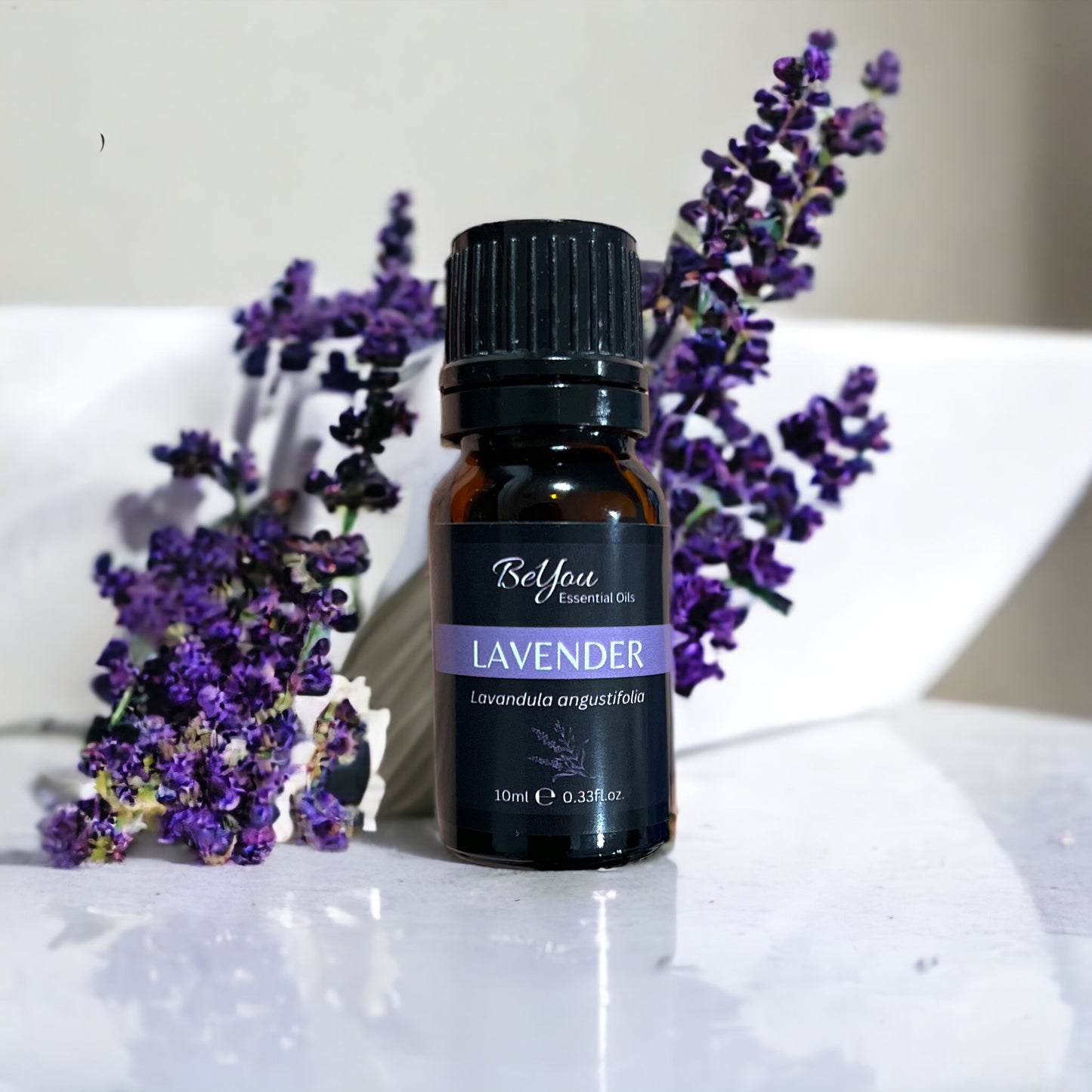Lavender Pure Essential Oil
Lavender Pure Essential Oil
Low stock: 2 left
Couldn't load pickup availability
DESCRIPTION
DESCRIPTION
Lavender essential oil is one of the most popular and versatile essential oils available, with a wide range of benefits and uses. It is derived from the flowers of the lavender plant through steam distillation and is known for its calming and soothing properties.
Benefits:
- Promotes relaxation and reduces stress and anxiety
- Helps improve sleep quality and alleviate insomnia
- Relieves pain and muscle tension
- Has anti-inflammatory and antimicrobial properties that can aid in wound healing and skin care
- May help alleviate headache and migraine symptoms
- Can be used as a natural insect repellent and air freshener
- Has soothing properties that can help relax the muscles of the gastrointestinal tract, relieve spasms, and reduce symptoms such as bloating, gas, and indigestion.
PRODUCT DETAILS
PRODUCT DETAILS
Botanical Name: Lavandula Angustifolia (Lavender) Oil
Derived from: Flowers
Origin: France
Extraction: Steam Distilled Essential Oil
Note: Middle to Top note
Aroma: Sweet, floral, fresh
- Vegan
- Non-GMO
- Not tested on animals
- Halal
- No carrier oils, 100% pure essential oil
Size: 10ml
DIRECTIONS FOR USE
DIRECTIONS FOR USE
Ways to use lavender essential oil:
- Aromatherapy: add 4-8 drops of lavender essential oil to a diffuser or vaporizer to help calm your mind and promote relaxation.
- Massage oil: mix 6-10 drops of lavender essential oil with 10ml carrier oil like jojoba oil or coconut oil to create a soothing massage oil.
- Bath oil: add a few drops of lavender essential oil to your bathwater to help you unwind and relax.
- Skin care: mix 1-2 drops of lavender essential oil with 5ml carrier oil of choice or unscented lotion to help soothe and moisturize your skin.
- Room spray: mix a few drops of lavender essential oil with water in a spray bottle to create a natural air freshener and deodorizer for your home.
- Insect repellent: add 1-2 drops of lavender essential oil with 5ml carrier oil or lotion of choice and apply to your skin to help repel insects.
- Headache relief: mix 1-2 drops of lavender essential oil with 5ml carrier oil of choice and apply to your temples to help alleviate headaches and migraines.
- Digestive Support: Inhalation: Add a few drops of lavender essential oil to a diffuser or inhale directly from the bottle. Topical Application: Dilute a few drops of lavender essential oil in a carrier oil, such as coconut oil or jojoba oil. Gently massage the diluted mixture onto your abdomen in a clockwise direction. Internal Use (with caution): Add a drop of lavender oil to a glass of water or herbal tea and consume it. This can provide a gentle support for digestion and a refreshing flavor. Start with a small amount and gradually increase if needed.
BLENDS WITH
BLENDS WITH
Blends well with:
- Bergamot
- Roman Chamomile
- Geranium
- Clary Sage
- Lemon
- Peppermint
- Eucalyptus
- Rosemary
- Ylang-Ylang
- Patchouli
SAFETY PRECAUTION
SAFETY PRECAUTION
SAFETY PRECAUTIONS:
Lavender essential oil is a versatile and beneficial natural remedy with numerous uses and applications. It's important to note that lavender essential oil should always be diluted with a carrier oil before topical use and should not be ingested without the guidance of a healthcare professional. Also, if you have any allergies, medical conditions, pregnant or breastfeeding, it's best to consult with your doctor before using lavender essential oil.


FAQs
-
What are essential oils?
Essential oils are highly concentrated plant extracts that capture the natural fragrance and beneficial properties of plants. They are typically obtained through processes like steam distillation or cold-pressing of various plant parts such as leaves, flowers, stems, or roots. Essential oils are known for their aromatic qualities and are commonly used in aromatherapy, personal care products, and natural remedies. -
How are essential oils used?
Essential oils can be used in several ways. Here are a few common methods:
- Aromatherapy: Inhalation of essential oils using diffusers, steam inhalation, or adding a few drops to a bowl of hot water.
- Topical application: Diluting essential oils with carrier oils (such as coconut or jojoba oil) and applying them to the skin for massage or skincare purposes.
- Internal consumption: Some essential oils are safe for internal use, but it is crucial to consult a qualified professional before ingesting them, as not all oils are suitable for internal consumption.
-
What are the potential benefits of essential oils?
Essential oils are believed to offer a range of potential benefits, but it's important to note that scientific research on their effectiveness is still evolving. Some commonly cited benefits include:
- Aromatherapy for relaxation, stress relief, and mood enhancement.
- Skin and hair care: Many essential oils are used in skincare products for their potential antimicrobial, anti-inflammatory, and soothing properties.
- Natural cleaning: Some essential oils possess antimicrobial properties and can be used as natural alternatives for household cleaning products.
- Potential respiratory support: Certain essential oils, such as eucalyptus or peppermint, are known for their potential respiratory benefits when inhaled.
-
Are there any risks or precautions associated with essential oils?
While essential oils are generally safe when used properly, there are a few important considerations:
- Skin sensitivity: Some essential oils can cause skin irritation or allergic reactions, especially when used undiluted or on sensitive skin. Always perform a patch test and dilute oils before applying them topically.
- Inhalation precautions: Not all essential oils are safe for inhalation, especially for individuals with respiratory conditions or sensitivities. Certain oils may trigger allergies or respiratory distress.
- Internal use: Internal consumption of essential oils should only be done under the guidance of a qualified professional. Many oils are toxic when ingested, and improper use can lead to adverse effects.
- Pregnancy and children: Some essential oils are not safe for use during pregnancy or on young children. It's crucial to consult healthcare professionals or certified aromatherapists for guidance in these situations.
Remember, it's always wise to consult with a healthcare professional or aromatherapist before using essential oils, especially if you have any underlying health conditions or concerns.
5. What is your extraction/collection process?
Refer to our Blogs for a detailed explanation about our Extraction and Collection process.
6. Are the plants sprayed with any chemicals which may lead to being included in the process of collecting the oil?
No, as our suppliers are certified there is no chemicals or pesticides being used on the plants, which are confirmed as each batch is analysed by microbiologist for the presents of bio-hazardous micro-organisms (such as bacteria and mould), heavy metals and pesticides.
7. Are the oils 100% organic as well as not diluted with fragrances or anything other than the plant itself?
Yes, all our Essential and Absolute oils are 100% organic, pure, with no carrier oils added, or fragrances.




